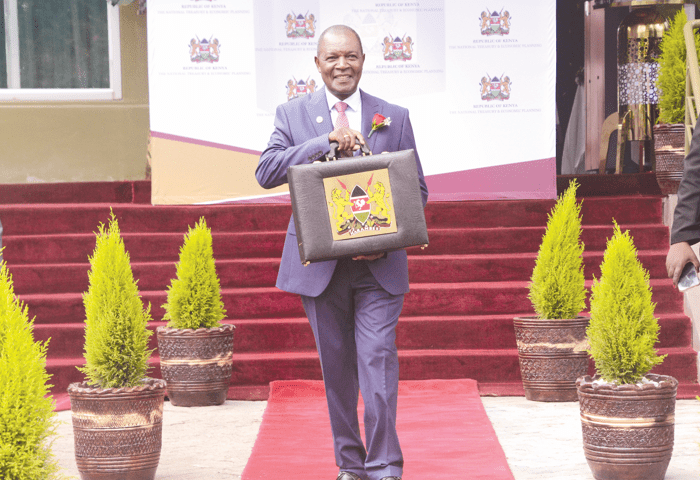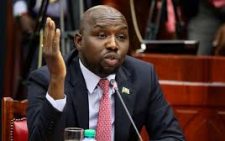Treasury delivers budget as Kenyans yearn for tax relief

President William Ruto’s government is today set to disclose how it intends to spend the Ksh3.9 trillion budget in the next financial year, commencing July 1.
National Treasury Cabinet Secretary Njuguna Ndung’u is expected to deliver the highlights of the 2024/25 budget to MPs this afternoon where he will explain how the three arms of government will finance and spend the budget.
He is also expected to explain how the Kenya Kwanza administration will navigate the tight balancing act between debt servicing and supporting the recovery of the economy.
The Sh3.9 trillion budget is a reduction of Ksh273.3 billion from Ksh4.188 trillion due to under-collection of revenue following Ruto’s directive that the budget should be realistic.
The budget comprises Ksh1.58 billion in recurrent expenditure, Ksh727.9 billion in development expenditure, Ksh1.2 trillion in Consolidated Fund Services and Ksh391.17 billion in county equitable share.
A statement from the National Treasury reads: “This is to notify the general public the Budget Statement for FY 2024/25 will be delivered by the Cabinet Secretary for the National Treasury and Economic Planning on Thursday, June 13 from 3pm in Parliament.”
The budget comes at a time when Kenyans have not only been grappling with high cost of living but have also raised concerns over the increased taxes that have continued to be imposed on them.
The National Assembly departmental committee on Finance and Planning has retreated to compile its report on the controversial Finance Bill after it concluded its meetings with various stakeholders and government institutions.
About 108 of 120 stakeholders in the manufacturing, telecommunication, edible oil, banking and digital sector have already opposed a number of proposals contained in the Finance Bill arguing that it will not lead to job losses but will also hurt Kenyans’ pockets.
In the budget, the executive has been allocated Sh2.243 trillion out of which Sh11.4 billion will go towards equalisation fund and Sh5 billion for contingency fund.
The Auditor General has been allocated Sh8.5 billion while parliament has been allocated Sh43.62 billion and the Judiciary Sh23.69 billion.
The Budget and Appropriations Committee (BAC) chaired by Kiharu MP Ndindi Nyoro in its report said that the budget is aimed at turning around the economy in view of the prevailing macroeconomics challenges.
The National Treasury estimates that the economy will grow by 5.5 per cent in 2024 and above 6.0 per cent on the average in the medium term from 5.6 per cent in 2023 and 4.9 per cent in 2022 due to improved agricultural output owing to above average rainfall, which they said will reduce the cost of food thereby lowering the cost of living.
Provide buffers
Further, the growth, National Treasury says is because of the continued implementation of Bottom Up Economic Transformation Agenda (BETA) value chains which are expected to spur investments, while private and government consumption is expected to provide buffers on the demand side.
Reads the report: “Key interventions include lowering the cost of living, creating employment opportunities, enhancing food security, improving the fiscal space, increasing foreign exchange earnings, and promoting inclusive growth.”
In the budget, the health sector has been allocated Sh126.8 billion of which Sh2.5 billion has been set aside for community health promoters to support preventative health care and Sh3.7 billion for the absorption of medical interns who have been on strike.
Critical illness fund
Linda Mama programme and equipping of various hospitals and Kenya Medical Training Institute have been allocated Sh3.7 billion. This also included an allocation to the recently established primary health care fund and emergency and critical illness fund.
The energy sector, infrastructure and Information and Communication Technology (ICT) has been allocated Sh462.8 billion which includes Sh178 billion for the roads sector, Sh42 billion in the transport sector while energy and electrification sector has been allocated Sh64.2 billion.
Reads the report of BAC: “Notably, under the energy sector, rural electrification, which includes the installation of new transformers and maximisation of existing ones, has been allocated Sh18 billion, out of which approximately Sh14.5 billion will be shared equally across all constituencies to enhance connectivity and access to power.”
The education sector got the largest share of the National Government budget at 34.8 per cent amounting to Sh654 billion for capitation, infrastructure and staffing of schools especially junior Secondary schools.
The Teachers Service Commission (TSC) has allocated half the amount going to the education sector at Sh351 billion for teacher resource management.
The other areas in the sector that have received major allocations include Free Day Secondary at Sh63.8 billion, Junior Secondary School (JSS) capitation at Sh30.6 billion and scholarships while loans for university and TVET students have been allocated Sh55 billion.
The other biggest allocation in the sector is the reinstatement of the Sh3 billion meant for the School Feeding Programme under the National Council for Nomadic Education in Kenya (NACONEK).
Reads the report: “The budget estimates for the Financial year 2024/25 are premised on a sustained economic growth trajectory.”
The other proposed increment in the sector include an increase of Sh6 billion for Public Universities to support continuing students who are funded under the old funding model of Differentiated Unit Cost (DUC), increment of Sh50 million for Kenya Universities and Colleges Central Placement Service (KUCCPS) for Personal Emoluments, operations and management, increase of Sh3 billion (recurrent) for HELB, increase of Sh1 billion (development) for various universities infrastructure as well as an Increase Sh500 million (recurrent) funding for government sponsored students in private university.
But despite the increment in the education sector, the BAC report however shows that there are major deductions that have been done on the university education vote and Technical Vocational Education and Training.
BAC has proposed number of cuts including a reduction of Sh130 million allocated for development for construction of 16 TTISs, reduction of Sh90 million from TVET infrastructure support, reduction of Sh5.2 billion from Universities Funding Board meant for students joining various universities in September 2024, reduction of Sh40 million from the Commission for University Education and Sh200 million from the Open University of Kenya.












